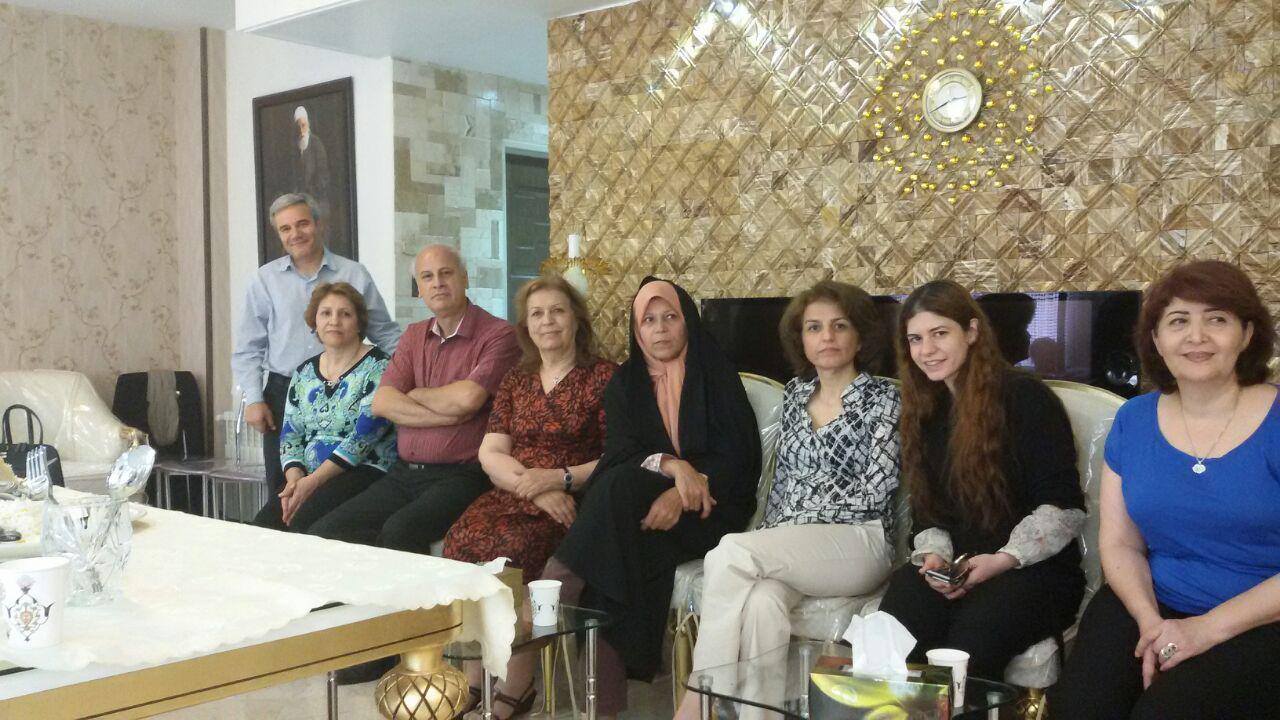Source: www.bbc.com
Translation by Iran Press Watch

The visit to a Baha’i leader by Faezeh Hashemi Rafsanjani, a former congresswoman, caused a harsh reaction by fundamentalist media.
Fariba Kamalabadi is on her first leave after eight years in prison. Faezeh Hashemi, Nasrin Sotoodeh and many other former prisoners of conscience who had been her cellmates during their time in prison have gone to pay her a visit.
While for years religious and government leaders of the Islamic Republic of Iran have considered any kind of communication with Baha’is, even including shaking their hand, to be abhorrent and execrable, publication of the photographs and videos of these visits has portrayed a different view.
Nasrin Sotoodeh defends her visit of Ms. Kamalabadi by saying that she had to see her, in recognition of all the “agonies” Baha’is have suffered for all these years.
Padideh Sabeti, a Baha’i International Community spokesperson, also states that apparently the walls of prejudices against Baha’is are being crushed little by little.
Other related article: Fariba Kamalabadi and the Case of the Seven Baha’i Leaders
“Mr. Hashemi: Say Something!”
The fundamentalist News Media, like the agencies Fars and Tasneem, have severely criticized the publication of a photograph of Faezeh Hashemi with a depiction of ‘Abdu’l Baha ‒ the son and successor of the founder of the Baha’i Faith ‒ hung behind her on the wall.
Fars News has released a letter from the Guild of Islamic Students entitled: “Mr. Hashemi 1, come to your senses; association of Faezeh with Baha’is is no longer a political issue.”
Tasneem News also printed the same letter, and has stressed the “demand that Akbar Hashemi Rafsanjani 1 take sides” on this issue and has frankly asked: “Why isn’t Faezeh Hashemi serving her full term in jail?”
This News Agency, like Fars News, has published opinions of both religious and political figures about Baha’is. The harshest words have been used against Baha’is in expressing many of these opinions; opinions such as it being “unclean” and being “unlawful” to shake hands with Baha’is 2.
This News Agency has reprinted previous religious edicts issued by Ayatollah Khamenei in regards to association with followers of Baha’i Faith that stated: “All followers of the misguided Baha’i sect are considered unclean; if they touch any object, that object must be cleansed according to Islamic law.”
Taghi Rahmani 3, a journalist and nationalist-religious activist, believes that the fundamentalist media are the true losers of this event, and that reprinting this edict will harm Ayatollah Khamenei.
“We do not have ‘unclean’ bodies in Islam; this religious scholar believes that a body can never become unclean”, Rahmani adds, referring to a thesis by Nematollah Salehi 4, an Islamic rhetorician and scholar.
According to Mr. Rahmani, the main goal of these harsh reactions to Ms. Hashemi’s visit is to attack her father, Akbar Hashemi Rafsanjani.
Why Visit?
This is not the first time Faezeh Hashemi Rafsanjani has somehow has shown support for Baha’is. In different interviews, she has stated that Baha’is, just like other citizens, should be able to practice their basic rights.
“Faezeh’s action is ‘avant-garde’, although the taboo on this issue was broken after the commentary by Ayatollah Montazeri 5”, Taghi Rahmani who as a nationalist-religious activist spent years in prison in Iran, but currently lives in Paris, told Persian BBC. He believes that the emotional environment in prison and also the “oppression” of Baha’i prisoners has affected relationships in prison.
Faezeh Hashemi and many other freed political prisoners who visited Ms. Kamalabadi were her cellmates for a while.
From the “Agony” They Suffer
Nasrin Sotoodeh, a lawyer and Human Rights activist who visited Ms. Kamalabadi told us; “As her cellmate for two years; she had been in prison for eight straight years without any furlough; the unjust constant suffering that has been forced on her people; this…obliged me to pay her a visit and will do whatever I can for her.”
But what significance do these visits and conversations have for the Baha’i community even as some high ranking Islamic Republic figures have called them “unclean” and have curtailed and banned any association with them?
Padideh Sabeti, a spokesperson for the Baha’i International Community, told BBC in London: “The barriers are breaking after many years of ignorance about the situation of Baha’is and their beliefs; those who come in contact with them are realizing the reality. Of course there are differences of opinion, but respecting the opinion of the others is a sign of progress in Iranian society, especially if practiced by religious conservatives.”
Taghi Rahmani believes that this is a political civic movement. “In the opinion of a Muslim intellectual, all citizens have equal rights, but there are religious communities and fanatics in Iran who are prejudiced against this.” He believes that the barriers of prejudice have not broken enough yet, although the cultural movement has started.
___
1. Both of these are references to Ali Akbar Hashemi Rafsanjani; see https://en.wikipedia.org/wiki/Akbar_Hashemi_Rafsanjani
2. In the Qur’an, certain things such as wine and blood, are designated religiously “unclean” or “impure” (najes). In Shi’i Islam, this has been extended to Baha’is. Here is an article which shows how this operates in practice: http://www.huffingtonpost.com/anthony-vance/iran-bahai_b_4320167.html
3. A short biography is available here: http://cyberdissidents.org/bin/dissidentsdb70.html?c=IR&id=192
4. For more details on Ayatollah Nematollah Salehi Najafabadi, see https://en.wikipedia.org/wiki/Nematollah_Salehi_Najafabadi
5. See this: https://en.wikipedia.org/wiki/Hussein-Ali_Montazeri, in which is stated: ” For more than two decades, Hussein-Ali Montazeri was one of the main critics of the Islamic Republic’s domestic and foreign policy. He had also been an active advocate of Baha’i rights, civil rights and women’s rights in Iran.”
Leave a Reply